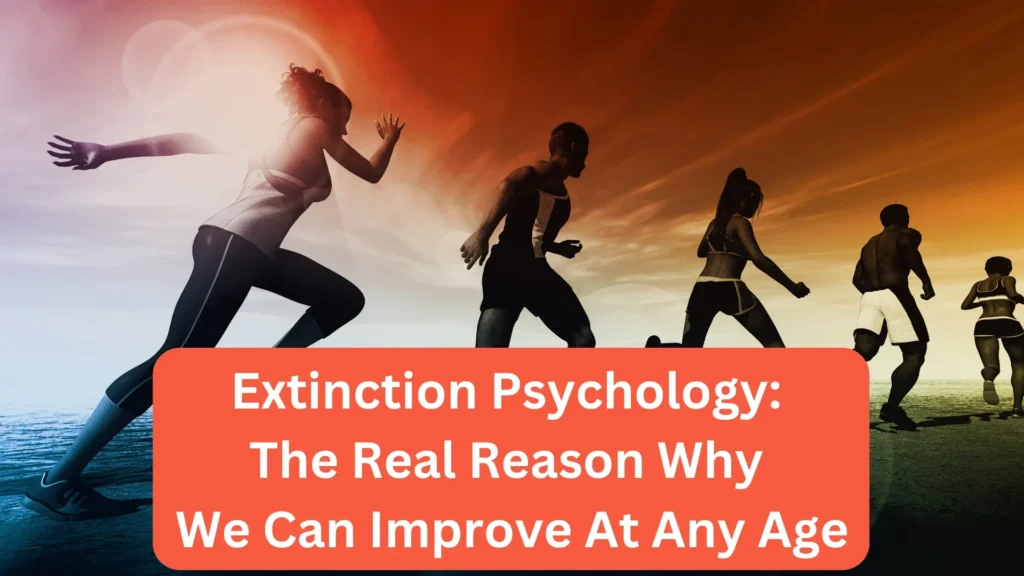
What is Extinction in Psychology?
Hey there, ever heard of extinction in psychology?
No, it’s not about dinosaurs or endangered species.
It’s all about behaviors and how we can make the unhelpful ones go away.
Extinction in psychology is when a previously reinforced behavior stops being reinforced and gradually fades away.
Think of it like this: imagine you always get candy when you hit a button.
One day, the candy stops coming, and eventually, you stop hitting the button.
Simple, right?
Let’s dive deeper into it!
How Is Knowing About Extinction in Psychology Going to Help Me?
So, why should you care about this extinction stuff?
Well, understanding how behaviors can be unlearned is a game-changer.
Especially when it comes to breaking bad habits or forming new, positive ones!
It’s like having a secret weapon for self-improvement.
If you’ve ever tried to quit smoking, stop biting your nails, or even just wanted to get off the couch and start running, knowing about extinction can be super handy.
First off, extinction can seriously boost your mental game.
By recognizing which behaviors or thoughts are holding you back, you can start the process of phasing them out.
This isn’t just about stopping bad habits. It’s about replacing them with actions and thoughts that propel you forward.
Imagine you’re always doubting your abilities before a big presentation.
Understanding extinction can help you identify and eliminate this self-doubt, replacing it with confidence and positive self-talk.
Ever feel like you’re stuck in a rut, unable to learn new skills or adapt to new situations?
Extinction psychology can help here too.
When you understand how to unlearn old habits, you make room for new ones.
This makes you more adaptable and open to change.
Whether it’s learning a new sport, picking up a musical instrument, or adapting to a new work environment, knowing how to phase out old patterns can make the learning process smoother and more effective.
Believe it or not, extinction can also improve your relationships.
Think about those little habits that might annoy your partner or friends, like constantly checking your phone during conversations.
By applying extinction principles, you can work on eliminating these behaviors, making your interactions more positive and enjoyable. This can lead to stronger, more fulfilling relationships.
Let’s not forget about the physical benefits!
Bad habits like poor posture, unhealthy eating, or skipping workouts can be tough to break.
Using extinction, you can gradually stop reinforcing these negative behaviors.
For instance, if you’re trying to stop snacking late at night, you could slowly phase out the habit by replacing it with healthier activities, like drinking water or taking a short walk.
In the workplace, extinction can help you get rid of unproductive habits.
Maybe you have a tendency to procrastinate or get distracted by social media.
By understanding and applying extinction principles, you can gradually eliminate these habits, leading to increased productivity and better performance.
Lastly, knowing about extinction can boost your emotional resilience.
Life throws curveballs, and sometimes we develop unhelpful coping mechanisms.
By using extinction, you can phase out these ineffective coping strategies and develop healthier ones.
This makes you more resilient in the face of stress and adversity, allowing you to bounce back quicker and stronger.
In a nutshell, knowing about extinction in psychology isn’t just about stopping unwanted behaviors.
It’s about creating a better, more adaptable you.
By understanding and applying these principles, you can improve various aspects of your life, from mental and physical health to relationships and career success.
So, embrace the power of extinction and watch yourself grow!
Extinction in Psychology and Its Relevance to Sports
Now, let’s talk sports.
Whether you’re a weekend warrior or a pro athlete, extinction can play a big role in boosting your performance.
Sports psychology often deals with breaking negative patterns—like choking under pressure or getting stuck in a slump.
By applying extinction principles, you can train your brain to let go of these unhelpful behaviors and replace them with actions that lead to success.
Athletes often hit performance plateaus where progress seems to halt.
This can be due to ingrained habits or mental blocks.
Understanding extinction can help you identify these barriers and systematically dismantle them.
For example, if you have a mental block about swimming a certain distance, extinction techniques can help you gradually desensitize to this fear, allowing you to push past previous limits.
Distractions and lapses in concentration can also be detrimental in sports.
By using extinction strategies, you can learn to minimize these distractions.
For instance, if crowd noise affects your performance, you might practice with simulated crowd noise until it no longer disrupts your focus.
Over time, your brain learns to ignore the noise, enhancing your concentration during actual events.
Bad habits in technique, like improper form in lifting or a flawed swing in golf, can be hard to break.
Extinction comes into play by helping you unlearn these poor techniques.
Through deliberate practice and feedback, you stop reinforcing the incorrect methods and replace them with proper form.
This not only improves performance but also reduces the risk of injury.
Handling pressure is crucial in sports!
Athletes often struggle with anxiety and stress, which can hinder performance.
Extinction helps by gradually exposing you to high-pressure situations in a controlled manner.
This exposure therapy can reduce anxiety over time, making it easier to perform under real pressure.
For example, practicing free throws in a high-stakes setting during training can help a basketball player become more comfortable in actual game scenarios.
Mental toughness is a key attribute for athletes.
Extinction psychology can help build this toughness by reducing fear responses.
If you’re afraid of failing or making mistakes, these fears can dominate your performance.
By repeatedly exposing yourself to these fears without the negative reinforcement (like harsh self-criticism), you can diminish the fear response, making you mentally tougher.
Injuries are part of sports, and recovering from them often involves breaking habits that led to the injury.
Extinction can aid in this recovery process by helping you avoid movements or behaviors that contributed to the injury.
For instance, if a runner has developed a bad stride due to an injury, using extinction can help them relearn a safer, more effective stride, aiding in a quicker and more complete recovery.
In team sports, understanding extinction can improve team dynamics.
Negative behaviors, like poor communication or lack of coordination, can be phased out by reinforcing positive interactions and teamwork.
Coaches can use extinction principles to promote behaviors that enhance team cohesion and performance, creating a more harmonious and effective team environment.
Obviously, learning new skills is essential for athletes looking to stay competitive.
Extinction helps by making it easier to replace outdated techniques with new, more effective ones.
Whether it’s a new play in football or a different grip in tennis, extinction can smooth the transition and make learning new skills more efficient.
In essence, extinction in psychology isn’t just about getting rid of bad habits. It’s about replacing them with behaviors that lead to success.
By applying these principles, athletes can overcome mental blocks, improve their techniques, and perform at their best, making extinction an invaluable tool in sports psychology.

Examples: How to Use Extinction Psychology in Sports and High Performance
Okay, enough theory!
Let’s dive into some real-life examples of how you can use extinction psychology to up your game.
Busting Pre-Game Jitters
Let’s say you get super nervous before a game.
This anxiety can tank your performance.
Using extinction, you might gradually expose yourself to game-like conditions without the pressure, allowing your brain to learn that these situations aren’t scary.
Over time, the pre-game jitters will fade away.
Breaking Bad Habits
Imagine you have a bad habit of always looking down when you swing in golf.
By deliberately practicing while keeping your head up and not reinforcing the old habit, you can extinguish that counterproductive behavior.
Enhancing Focus
Distractions are the enemy of high performance.
If you’re constantly getting distracted by the crowd or your own thoughts, you can practice in a controlled environment where these distractions are minimized.
Gradually, you’ll learn to ignore them even when they’re present, keeping your focus sharp.
Overcoming Fear of Failure
Fear of failure can be a significant barrier to peak performance.
Athletes often hesitate to take risks because they’re afraid of making mistakes.
By using extinction techniques, you can expose yourself to failure in a controlled setting.
For instance, intentionally practicing challenging skills where failure is likely can help you get used to it and reduce the fear response.
Over time, you’ll become more comfortable taking necessary risks in real competitions.
Developing Consistency
Consistency is key in sports.
If you find yourself performing well in practice but not in actual games, extinction can help.
By simulating game conditions during
practice, you can reduce the gap between practice performance and game performance. This way, your brain learns to perform consistently, regardless of the setting.
Managing Performance Anxiety
Performance anxiety can sabotage your efforts, especially in crucial moments.
To combat this, you can use extinction by gradually exposing yourself to high-pressure scenarios.
Start with low-stakes situations and slowly increase the pressure.
For example, a tennis player might start by playing practice matches with a few spectators and gradually increase the number of viewers.
Over time, this reduces the anxiety associated with playing in front of large crowds.
Eliminating Negative Self-Talk
Negative self-talk can erode confidence and hinder performance.
To use extinction, identify the negative thoughts that arise during performance and consciously replace them with positive affirmations.
Over time, the negative thoughts will diminish, and your brain will start to default to positive self-talk, boosting your confidence and performance.
Refining Techniques Under Pressure
Perfecting techniques under pressure is vital for success.
Suppose a basketball player struggles with free throws during games but not in practice.
By practicing free throws under simulated game pressure (e.g., with a noisy crowd or time constraints), the player can extinguish the anxiety associated with real-game scenarios, leading to better performance during actual matches.
Incorporating extinction psychology into your training routine can transform your performance.
By understanding and applying these techniques, you can overcome mental barriers, refine your skills, and achieve peak performance.
It’s a powerful tool that can help you reach new heights in your athletic journey.

The Unexpected Benefits of Extinction Psychology
You might think extinction is just about getting rid of bad habits, but it also helps in forming new, positive ones.
By understanding the process, you can reinforce behaviors that lead to success more effectively. It’s all about rewiring your brain to support your goals.
- Boosting Creativity and Innovation:
One unexpected benefit of extinction psychology is its ability to boost creativity and innovation.
By eliminating rigid, unproductive thinking patterns, you make space for more creative thoughts and ideas.
This can be especially beneficial in sports where adaptive thinking and innovative strategies can provide a competitive edge.
For example, a basketball player might develop new plays or techniques once they’ve moved past old, limiting habits.
- Enhancing Decision-Making Skills
Extinction can also improve your decision-making skills.
When you phase out impulsive or poorly thought-out decisions, you train your brain to take a more measured and analytical approach.
This is crucial in high-stakes sports situations where quick, yet smart decisions can make the difference between winning and losing.
- Building Better Habits
As you use extinction to remove negative behaviors, you naturally begin to replace them with better habits.
This isn’t just about stopping something bad. It’s about starting something good.
For instance, if you stop procrastinating on your training, you’ll likely develop a more consistent and disciplined workout routine, leading to better overall performance.
- Increasing Self-Awareness
Understanding and applying extinction principles can significantly boost your self-awareness.
You become more attuned to your habits, both good and bad, and understand the triggers and reinforcements behind them.
This heightened self-awareness allows you to take proactive steps in managing your behavior, emotions, and reactions, which is invaluable in both sports and everyday life.
- Reducing Stress and Anxiety
Extinction psychology can help reduce stress and anxiety by removing the behaviors that contribute to these feelings.
If you have a habit of overthinking or worrying excessively, using extinction to phase out these behaviors can lead to a calmer, more focused mind.
This can enhance your overall well-being and performance under pressure.
- Strengthening Mental Resilience
Mental resilience is about bouncing back from setbacks and staying strong in the face of adversity.
By using extinction to gradually eliminate your fear responses and negative thought patterns, you build a more resilient mindset.
This is crucial not just in sports but in all areas of life, helping you handle challenges with greater ease and confidence.
- Fostering a Growth Mindset
A growth mindset is the belief that abilities and intelligence can be developed with effort and perseverance.
Extinction psychology helps foster this mindset by encouraging you to unlearn fixed, limiting beliefs and replace them with more positive, growth-oriented ones.
This shift in perspective can motivate you to push your boundaries and continuously improve.
- Enhancing Emotional Intelligence
By phasing out negative emotional reactions and behaviors, extinction psychology can also enhance your emotional intelligence.
You become better at managing your emotions, understanding others’ feelings, and navigating social interactions.
This can improve teamwork and communication in sports, as well as your relationships off the field.
- Encouraging Long-Term Change
Unlike quick fixes or temporary solutions, the changes brought about by extinction psychology are often long-lasting.
Because you’re fundamentally altering your behavior patterns and thought processes, the improvements you make are more likely to stick.
This leads to sustained high performance and continuous personal growth.
- Promoting a Healthier Lifestyle
Lastly, using extinction to eliminate unhealthy habits can lead to a healthier lifestyle overall.
Whether it’s cutting out junk food, reducing screen time, or sticking to a regular exercise routine, the principles of extinction can help you make lasting, positive changes that benefit your physical and mental health.
In a nutshell, knowing about extinction in psychology isn’t just about stopping unwanted behaviors.
It’s about creating a better, more adaptable you.
By understanding and applying these principles, you can improve various aspects of your life, from mental and physical health to relationships and career success.
So, embrace the power of extinction and watch yourself grow!
Conclusion
The coolest thing about extinction psychology is that it shows us we can improve at any age.
Whether you’re 16 or 60, it’s never too late to change those pesky habits and start building new, better ones.
And guess what?
You don’t have to do it alone!
If you’re looking for a way to kickstart your journey to high performance, check out the Success Stories Membership.
It’s packed with specially designed training programs that use principles like extinction psychology to help you break through barriers and achieve your best.
Imagine having a team of experts guiding you, providing strategies, and celebrating your victories.
Sounds pretty awesome, right?
So, there you have it!
Extinction psychology isn’t just some fancy term. It’s a powerful tool that can help you improve, no matter where you’re starting from.
Keep pushing, keep learning, and remember, you’ve got what it takes to succeed!



